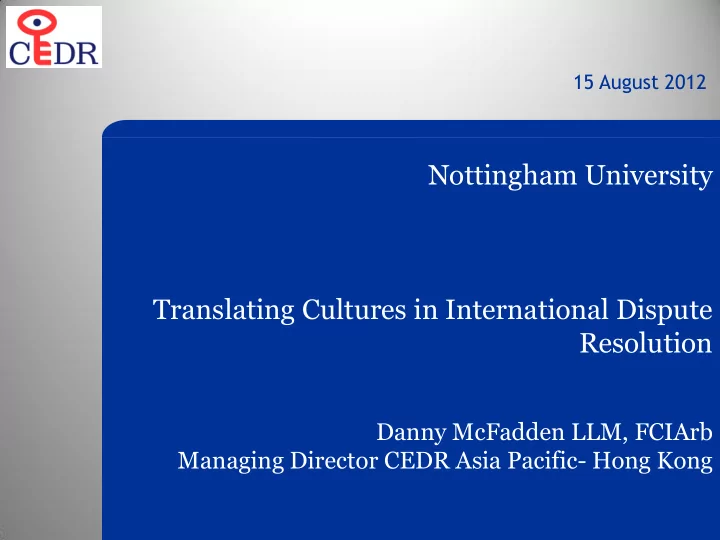

15 August 2012 Nottingham University Translating Cultures in International Dispute Resolution Danny McFadden LLM, FCIArb Managing Director CEDR Asia Pacific- Hong Kong 1 1
Interpreter experience 1 1
Interpreters Xiamen China 1988 1 1
Acting as an Interpreter Fujian International TV Festival 1988 Participants: USA, Italy, Japan, Belgium, Australia, Germany • Difficulties • Role of interpreters • Mediating • Neutrality and Cultural Bridge • Face saving 1 1
Use of non – professionals The Creepy Crawly Language not just about the words Different persona Meeting expectations both sides • Australians • Mum and Dad Chinese Mixed messages • Difficulties mediation for neutral 1 1
Communication “Without communication there is no negotiation…. When the parties speak different languages the chance for misinterpretation is compounded.” ( Getting To Yes-Fisher) 1 1
Communication • 7% through the words used in an interaction Paralanguage • 38% through the pitch, tone, pace, of the voice Body language • 55% through the gesture and appearance 1 1
Active listening • Observing and understanding non-verbal communication • Awareness and use of own non-verbal signals • Appropriate use of silence and Reflection of feelings • Paraphrasing and summarising • Use of questions. 1 1
Facilitated negotiation Interpreters as conduits for the communication 1 1
Facilitated negotiation Interpreters as actors in the mediation 1 1
Technology • Use of technology 1 1
Emotion and Interpreters Refugee torture case • Difficult subject matter • Dealing with the emotion of the speaker • Parties and advisers familiar with the scenario • Need to assist interpreter handle the emotion • Psychological preparation 1 1
Listen to the Parties not the interpreter Hainan case • Use of “their” interpreter • Part of their team • Limelight and status • Start to focus on the interpreter not the key actors • Comfort zone • Payback “loss of face” 1 1
Mediating with Interpreters • Mediator as interpreter • Role confusion • Mediator language competence • Level of interpreter competence “To intercede or not to intercede that is the question” 1 1
Mediator training • Mediator training working with interpreters • Choice of “Pivot” language • Who chooses? • Ethnicity and Nationality of the Mediator • Importance • Language spoken by the Interpreter 1 1
Tips: Working with Interpreters • Talk to the receiver or speaker, not the interpreter- Eye contact • Encourage party talk directly to you (arrange seating) • Use plain English/Mandarin • Do not speak too quickly (or too slowly) • Keep sentences short: one idea or question at a time • Pause allow sufficient time for translation • Repeat the same information in different ways 1 1
Tips: Working with Interpreters • Avoid over-simplification of information • Avoid culturally specific metaphors • Encourage the interpreter to suggest when to clarify information • Provide opportunities for the party to use their preferred communication style e.g. tell a story rather than using question and answer routines • Understand linguistic and politeness conventions • Check frequently the message has been understood 1 1
Mediator training Put picture here 1 1
Recommend
More recommend